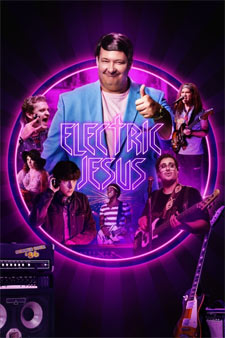


When a flashy promoter (played by Brian Baumgartner, The Office) sells sound man Erik (Andrew Eakle) and his favorite local Christian hair metal band, 316, on the promise of a bus tour in the summer of 1986, their desire to "make Jesus famous" meets the complexities and confusion of personal ambition, religious conviction, youthful zeal, lifelong friendships, and first love. (from Click Communications)
Electric Jesus is a new music-driven indie film that feels cut from the same cloth as Blue Like Jazz, with a dash of Bohemian Rhapsody. The story follows a group of teens in Columbia, South Carolina in 1986, who make up a hair metal band called 316 and suddenly get the life-changing chance to go on a mini road tour. Erik, played by Andrew Eakle, accompanies the band as their new sound guy - a well-meaning teen who believes he can help 316's mission to "make Jesus famous." It's an admirable goal with pure intentions, but, sadly, Electric Jesus sets out to prove that good intentions often aren't enough.

The opening scene of Electric Jesus shows 316 playing in a bar and getting cussed out while being encouraged to get off the stage. The story then flashes back to some weeks before as the teens entertain a youth group and Erik reflects on meeting and getting hired as their sound technician. There's enough authenticity brought to the story about what Christian rock music was like in the mid-80's, that it almost feels like this is a true biopic about a real band. However, a lot of liberties are still taken throughout the story to remind those with even a basic knowledge of Christian music in the 80's that this isn't exactly a true story. Still, I was impressed by the name-dropping the characters do throughout the film, and the little details, all the way down to a band member wearing a Die Happy t-shirt, or hearing the names of acts like One Bad Pig, Petra and Idle Cure.
When I first saw the trailer for Electric Jesus, I felt like it was unclear what the intentions of this film were. In a way, it felt like a mockery or satire, but it also seemed like it could end up being a sincere throwback to the Christian hair metal era. While watching the movie, I still felt like it was little bit more of a cynical view of the Christian rock ministry lifestyle. While the grittier aspects of the story weren't unwarranted, I never felt like the ends justified the means. At the risk of spoiling the story for you - and even promotional plot descriptions for the movie have specified that this is the story of a band who doesn't make it - the reasoning for why that may be never really feels realistic. As someone who has gotten a peek behind the proverbial curtain of the Christian music industry several times since starting this site in the mid-1990's, I did find some of the moral struggles of the band members to be quite on the nose. However, when everything "hits the fan," so to speak, it seems over-the-top and melodramatic in a way that is really a hard sell. And from that point on, the movie sort of meanders as it tries to figure out how to wrap up its story. It's as if the filmmakers had an idea for a film and for a few scenes, but weren't quite sure what the full story should be -- or what point it wants to make. There is a thesis statment when everything sort of falls apart, but I'm not quite sure it connects to the story that leads up to this moment.

The Office's Brian Baumgartner is excellent as 316's manager, Skip Wick (he even has a name that makes you question the guy's character). Skip claims to have the kids' best interests in mind, and have a heart for Jesus, but he also swears sometimes and clearly has a drinking problem (and maybe other issues). His salesman persona is slick and greasy (like his hair piece), and you kind of expect him to turn out to be a wolf in sheep's clothing at any moment. I've heard some real-life horror stories about artist managers in even the Christian music market, so any wrong that Skip could do wouldn't be farfetched. Baumgartner nails that questionable industry guy persona perfectly. The main character of the movie, however, is Andrew Eakle's Erik, who mostly feels like a charisma blackhole on the screen. He seems to loosen up a little as the movie progresses, but it's hard to buy into his initial claims to have an immovable faith in Jesus when most of the lines he delivers seem like he's distracted or sedated. The other members of 316 fair a lot better, with each guy feeling real; I felt like I could almost place a real life member from a Christian band for each one of them. But since Erik tells the story through voiceover as it follows his first-hand experience (which is also what takes me back to Blue Like Jazz), there's a lot here that's riding on Eakle's shoulders. He does okay in the end, but the story only gives these guys so much to work with.
Electric Jesus goes all-in on the musical biopic format. Several concert scenes show the band performing nearly entire songs, and one fun interlude where the gang is celebrating by rocking out to a Styper song while dancing around a hotel room plays the entire song. However, even that scene goes on way, way too long when a snippet would have sufficed. The long song samples make the movie feel like the story is sidelined in favor of playing songs that were written just for this movie (the Stryper tracks excluded). They're also not even modern songs in a modern style, so if you don't like (or don't still like) the "hair metal" style, you're in for a surprise. Honestly, the inclusion of full songs (or, at least what feels like full songs) wouldn't be an issue if the story and pacing didn't suffer some as a result.

While this little indie film is Not Rated, the content is definitely PG-13. There are 5 uses of the "S" word, a few of "d*mn," "h*ll," and "*ss," and a few use's of God's name from Skip. The story tries to deconstruct the preconceived notions that God needs His children to "make Him famous," by trying to show a misuse of the message of John 3:16 and point to Matthew 18:20 ("For where two or three gather in my name, there am I with them.") as an alternative. Overall, the approach to the message feels somewhat cynical - that maybe the way we go about music ministry and our ministry goals are all wrong. And sure, there's all kinds of room for error when flawed humans are involved, but I don't necessarily think 316's original intentions were off. And I don't feel like Electric Jesus does a good job illustrating what was so wrong with their intentions. (And, again, the resolution at the end ultimately doesn't work as the reasons for it all coming to an end don't seem realistic or believable. Maybe it was in 1986, perhaps, but knowing that bands have survived far worse than what 316 has to endure makes the reasons for their fallout weak and even kind of silly. I felt that scene actually pulled me out of the movie.)
Director Chris White has stated in promotional materials for Electric Jesus that the movie "was born out of years of looking back, reconstructing, re-discovering moments and memories I’d long since left behind that suddenly fascinated me. I missed being a Christian youth group kid. I missed the certainty, the comfort...I missed Jesus." He later added that the film was "actually about... believing in something so much it all gets too big to fail...all the while, completely missing the existentially huge story that’s happening right under your nose. And only being able to realize that several decades later when it's too late to do it over." I'm not quite sure White has conveyed that point clearly, but what he does get right is capture some of that youth group lifestyle, the naive but pure enthusiasm and passion for Christian rock in that time, and what some of these church events were like. He also did a nice job capturing that awkward teen love that Erik has with Sarah -- how it's easy to feel like falling in love with someone while you're trying to keep your mind fixed on Jesus can feel wrong because of its distraction from living for Jesus.

So, flawed as it might be, Electric Jesus is a much different Christian movie than we're accustomed to. It isn't really set out to minister to people, but does seem like it's almost a therapy session for anyone who is familiar with what it was like to grow up in this kind of church community. And it's that apologetic vibe that makes the film feel more cynical than your usual Christian film (Again, like Blue Like Jazz was, too). The evangelistic Christian movie often feels heavy-handed, formulaic, and insincere (at times), but you can often tell the heart is in the right place. Electric Jesus seems like it's spun from a place of discontent, and maybe White did rediscover some passions while making the film; I just don't think it necessarily translated to the screen in the end.
Disclaimer: All reviews are based solely on the opinions of the reviewer. Most reviews are rated on how the reviewer enjoyed the film overall, not exclusively on content. However, if the content really affects the reviewer's opinion and experience of the film, it will definitely affect the reviewer's overall rating.
 Casey J Drops First Album in 6 Years, "The Stories We Sing Vol. 1" Casey J Drops First Album in 6 Years, "The Stories We Sing Vol. 1"Thu, 05 Mar 2026 13:46:00 EST |
 The K-LOVE Fan Awards Returns to Nashville's Opry House May 24 The K-LOVE Fan Awards Returns to Nashville's Opry House May 24Thu, 05 Mar 2026 13:35:00 EST |
 StowTown Records Releases New Album "Rise and Shine" from Sunday Drive StowTown Records Releases New Album "Rise and Shine" from Sunday DriveThu, 05 Mar 2026 13:12:00 EST |
 Mat Kearney Announces "Nothing Left To Lose" 20th Anniversary Tour Mat Kearney Announces "Nothing Left To Lose" 20th Anniversary TourWed, 04 Mar 2026 19:10:00 EST |
 We The Kingdom Celebrates RIAA Gold Certification of "God So Loved" We The Kingdom Celebrates RIAA Gold Certification of "God So Loved"Tue, 03 Mar 2026 18:40:00 EST |
 Mary-Clair Attends Lionsgate's "I Can Only Imagine 2" Premiere Mary-Clair Attends Lionsgate's "I Can Only Imagine 2" PremiereTue, 03 Mar 2026 18:30:00 EST |
 Stand41TrueGod to Release New Single "Wilderness" on All Platforms March 13 Stand41TrueGod to Release New Single "Wilderness" on All Platforms March 13Tue, 03 Mar 2026 18:20:00 EST |
 Click here All News Headlines |
Click here All News Headlines |